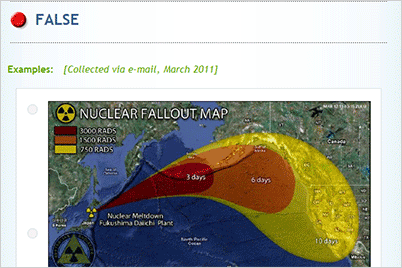Has Google Manipulated Search Results to Calm Fears?
If you hear about killer fallout from the Japanese nuclear plants coming to the US, it isn’t. The story, complete with maps, is a hoax.
One of the best discussions on a phony map was published two days ago on Blogotariat.com.
One of the more interesting bits mentioned in passing in Blogotariat was their observation that Google is manipulating results to help quash the rumors spawned by the map. Despite an hysterical number of posts and Tweets, Blogotariat claimed that Google put on the top of the search results sites that calmed rather than inflamed.
Indeed, I just did a Google search for “nuclear fallout map”. The #1 web page result was one posted yesterday from the rumor control site, Snopes. The picture of the map on the right with the clear label of “FALSE” is from Snopes.
Google regularly claims that it does NOT manipulate search results. It says that automatic algorithms determine the order information appears in its results. Google uses the “software defense” against all claims of bias and commercial manipulation.
Up to now I have believed Google’s claims that no humans are involved. But, now I wonder.
- For a page put up yesterday — as Snopes’ was — to be number 1 for a popular topic is unusual.
- When I checked the Page Rank (a measure of how popular Google thinks a page is) for the Snopes page, the page shows as “unranked”. For a page without ranking to show up high in search results is unusual… although the home page at Snopes.com is a very highly rated 8.
- There were also no backlinks to the page, according to the Google toolbar. Backlinks indicate to Google that a page is used as an authority by other sites and therefore should show up higher in results.
So, although I haven’t done a thorough search engine optimization review for the Snopes.com debunking page, it seems to be possible that human intervention helped the Snopes rumor control page snag #1 position. Especially since:
- Google’s company policy is to do no evil. Helping spread panic would be doing evil. Taking steps to keep popular — but false and inflammatory pages — lower in search results would prevent Google from doing evil.
The possible changing of search results means that in the future I am going to be a bit more skeptical of Google’s claim that all search results are automatic. While Google’s motives in this case are benign — or at least in concert with my instincts and morals — manipulating results is worrisome. Could Google modify results to eliminate political views/commerical products/competitor information they don’t like? Do they already? Will they?
Yep, something to worry about. But, Google’s possible manipulation is a much smaller lump of worry to have than the worry lump I’d have if I had believed the faked fallout map.
So thank you, Google. But, I’ll be watching you.
And, of course, everyone can calm their friends about this — and other Internet rumors — by referring people to responsible places like Snopes.com!

